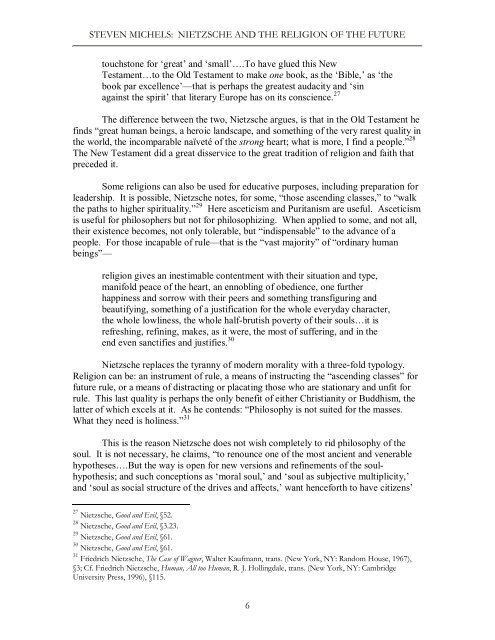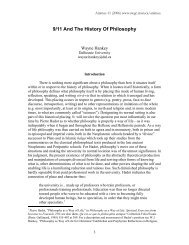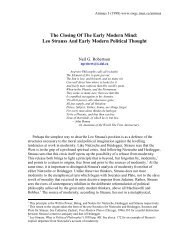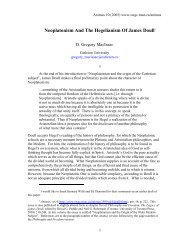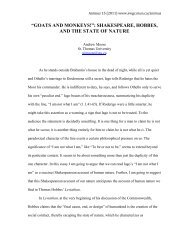Nietzsche And The Religion Of The Future
Nietzsche And The Religion Of The Future
Nietzsche And The Religion Of The Future
You also want an ePaper? Increase the reach of your titles
YUMPU automatically turns print PDFs into web optimized ePapers that Google loves.
STEVEN MICHELS: NIETZSCHE AND THE RELIGION OF THE FUTUREtouchstone for ‘great’ and ‘small’….To have glued this NewTestament…to the Old Testament to make one book, as the ‘Bible,’ as ‘thebook par excellence’—that is perhaps the greatest audacity and ‘sinagainst the spirit’ that literary Europe has on its conscience. 27<strong>The</strong> difference between the two, <strong>Nietzsche</strong> argues, is that in the Old Testament hefinds “great human beings, a heroic landscape, and something of the very rarest quality inthe world, the incomparable naïveté of the strong heart; what is more, I find a people.” 28<strong>The</strong> New Testament did a great disservice to the great tradition of religion and faith thatpreceded it.Some religions can also be used for educative purposes, including preparation forleadership. It is possible, <strong>Nietzsche</strong> notes, for some, “those ascending classes,” to “walkthe paths to higher spirituality.” 29 Here asceticism and Puritanism are useful. Asceticismis useful for philosophers but not for philosophizing. When applied to some, and not all,their existence becomes, not only tolerable, but “indispensable” to the advance of apeople. For those incapable of rule—that is the “vast majority” of “ordinary humanbeings”—religion gives an inestimable contentment with their situation and type,manifold peace of the heart, an ennobling of obedience, one furtherhappiness and sorrow with their peers and something transfiguring andbeautifying, something of a justification for the whole everyday character,the whole lowliness, the whole half-brutish poverty of their souls…it isrefreshing, refining, makes, as it were, the most of suffering, and in theend even sanctifies and justifies. 30<strong>Nietzsche</strong> replaces the tyranny of modern morality with a three-fold typology.<strong>Religion</strong> can be: an instrument of rule, a means of instructing the “ascending classes” forfuture rule, or a means of distracting or placating those who are stationary and unfit forrule. This last quality is perhaps the only benefit of either Christianity or Buddhism, thelatter of which excels at it. As he contends: “Philosophy is not suited for the masses.What they need is holiness.” 31This is the reason <strong>Nietzsche</strong> does not wish completely to rid philosophy of thesoul. It is not necessary, he claims, “to renounce one of the most ancient and venerablehypotheses….But the way is open for new versions and refinements of the soulhypothesis;and such conceptions as ‘moral soul,’ and ‘soul as subjective multiplicity,’and ‘soul as social structure of the drives and affects,’ want henceforth to have citizens’27 <strong>Nietzsche</strong>, Good and Evil, §52.28 <strong>Nietzsche</strong>, Good and Evil, §3.23.29 <strong>Nietzsche</strong>, Good and Evil, §61.30 <strong>Nietzsche</strong>, Good and Evil, §61.31 Friedrich <strong>Nietzsche</strong>, <strong>The</strong> Case of Wagner, Walter Kaufmann, trans. (New York, NY: Random House, 1967),§3; Cf. Friedrich <strong>Nietzsche</strong>, Human, All too Human, R. J. Hollingdale, trans. (New York, NY: CambridgeUniversity Press, 1996), §115.6


